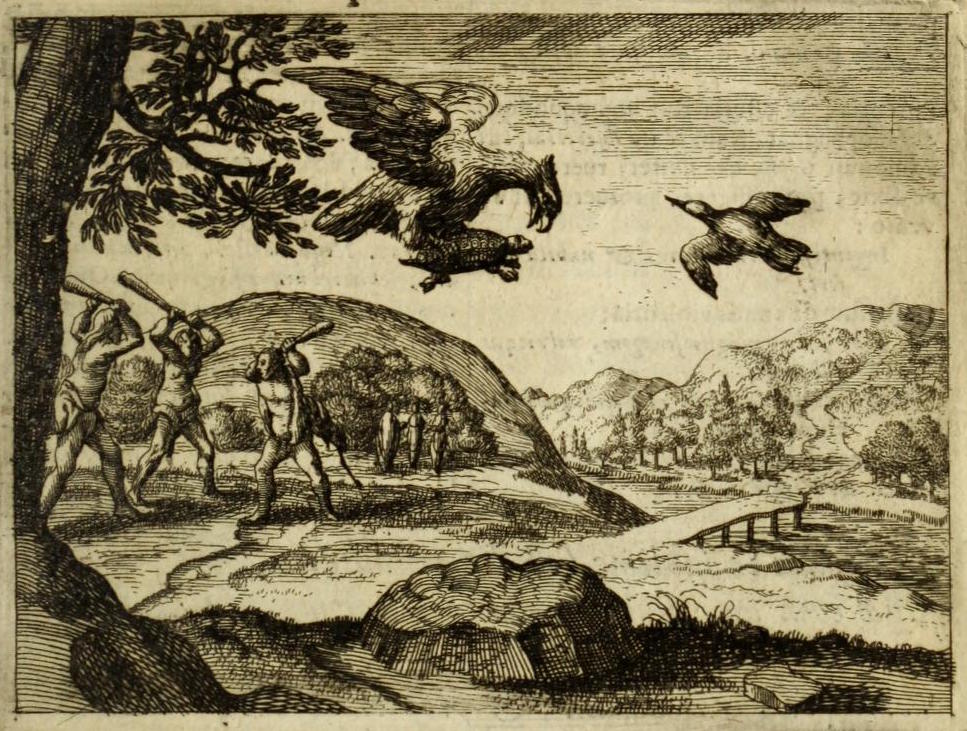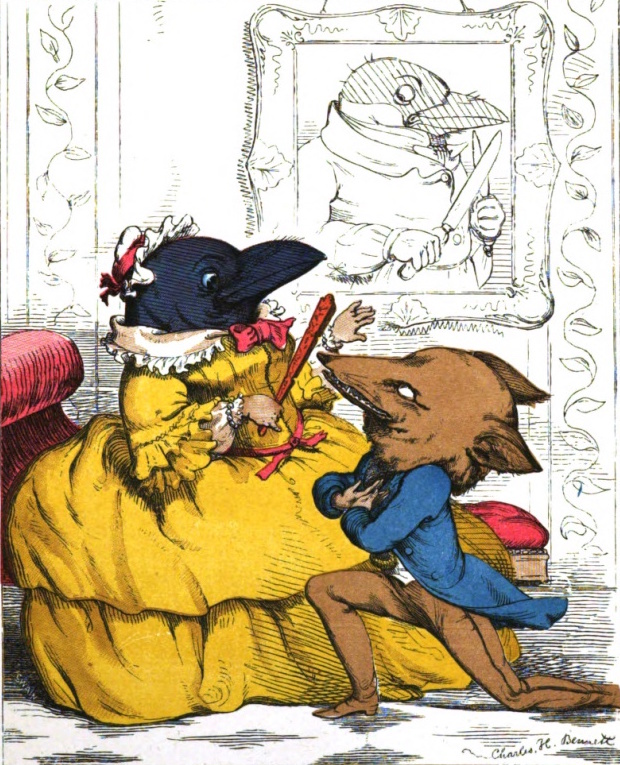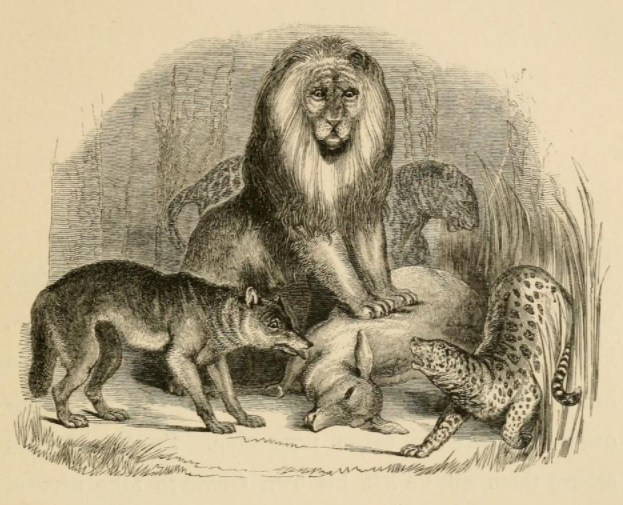6. Of the Eagle and the Jackdaw
An eagl,e having got a cockle, was not able to get out the fish by force or art. The jackdaw coming up gives counsel, persuades her to fly up, and from on high to throw down the cockle upon the stones, for that so it would be that the cockle would be broken. The jackdaw stays on the ground that she may watch the fall: the eagle throws it down; the shell is broken; the fish is snatched away by the jackdaw; the deluded eagle grieves.
Moral. Be not willing to have faith in all men, and do you look into the counsel which you have received from others; for many, being consulted, do not counsel for their consultors, but for themselves.

7. Of the Crow and the Fox
A Crow having got a prey, makes a noise in the branches: the fox sees him rejoicing, runs up: "The fox," says he, "compliments the crow with very much health. Very often had I heard, that fame was a liar; now I find it in the fact itself: for, as by chance I pass by this way, seeing you in the tree, I fly to you, blaming fame: for the report is, that you are blacker than pitch, and I see you whiter than snow. Truly in my judgment you surpass the swans and are fairer than the white ivy. But if as you excel in feathers, you do so also in voice, truly I should call you the queen of all birds." The crow allured by this flattery prepares to sing. But the cheese fell from his beak; which, being snatched by the fox, he sets up a laughter: then at last the crow, shame being joined to the loss of the thing, grieveth.
Moral. Some are so greedy of praise that they love a flatterer, with their own disgrace and damage. Men of this kind are a prey to the parasite. But if you had avoided boasting, easily would you have avoided the pestilent race of flatterers. If thou art willing to be a Thraso, a Gnatho never will be wanting to thee.

8. Of the Dog and the Ass
While the dog fawned on his master and the family, the master and the family stroke the dog. The ass, seeing that, groans most deeply; for he began to be weary of his condition: he thinks it unjustly ordered that the dog should be acceptable to all, and be fed from his master's table, and that he should get this by idleness and play: that himself on the contrary carried the dorsers, was beaten with the whip, was never idle, and yet odious to all. If these things are done by fawnings, he resolves to follow that art which is so profitable. Therefore on a certain time about to try the thing, he runs in the way to his master returning home, leaps on him, strikes him with his hoofs. The master crying out, the servants ran to him, and the silly ass, who thought himself courtly, is beaten.
Moral. We all cannot do all things; nor do all things become all men. Let every one do, let every one try that which he is able.

9. Of the Lion and Some Other Beasts
The lion had agreed with the sheep and some others that the hunting should be common. They hunt, a stag is taken: all beginning to take their single parts, as had been agreed, the lion roared, saying, one part is mine, because I am the most worthy; another also is mine, because I am most excellent in strength; moreover, I claim a third because I have sweated more in taking the stag; lastly, unless you will grant the fourth, there is an end of friendship. His companions, hearing this, depart, emtpy and silent, not having dared to mutter against the lion.
Moral. Faith always has been rare: in this age it is rarer; among the powerful it is, and always has been, most rare. Wherefore it is better to live with an equal. For, he who liveth with one more powerful, often hath a necessity to depart from his right.

10. Of the Lion and the Mouse
The lion, tired with heat and running, rested under the shade upon the green grass; a company of mice running over his back, having arose, he takes one of them. The captive begs, cries that he was unworthy whom the lion should be angry with. He, thinking there would be nothing of praise in the death of so little a beast, dismisses the captive. Not long after, the lion, whilst he runs through the forest, falls into the toils. He roars, but cannot get out. The mouse hears the lion miserably roaring, knows the voice, creeps into the holes, seeks the knots, which he finds and gnaws; the lion escapes out of the toils.
Moral. This fable recommends clemency to the powerful; for as human things are unstable, the powerful themselves sometimes want the help of the lowest; wherefore a prudent man, although he is able, feareth to hurt even a mean man; but he that does not fear to hurt another, plays the fool very much. Why so? Because, although now having relied on his power he feareth nobody, perhaps, hereafter, it will be that he may have wanted either the favor of mean men, or have feared their anger.

No comments:
Post a Comment
Comments are limited to Google accounts. You can also email me at laurakgibbs@gmail.com or find me at Twitter, @OnlineCrsLady.